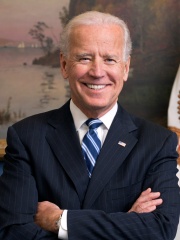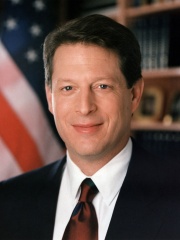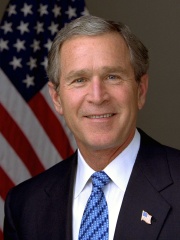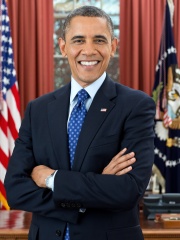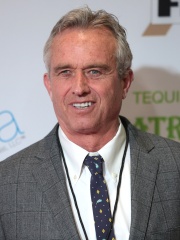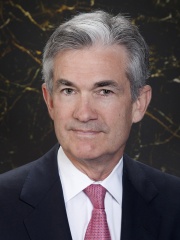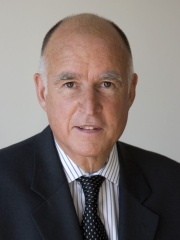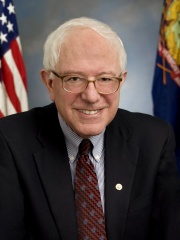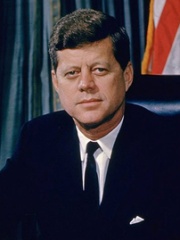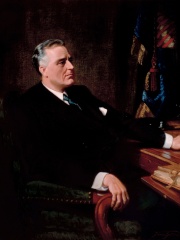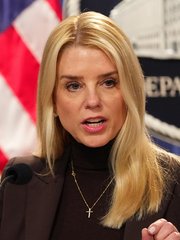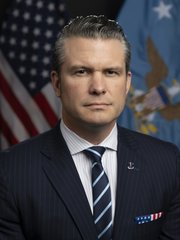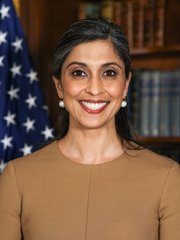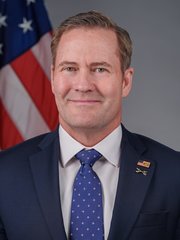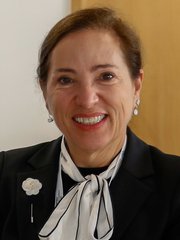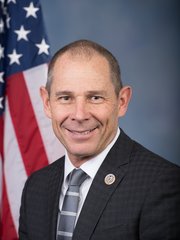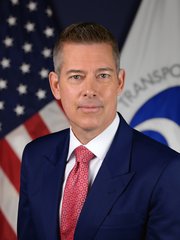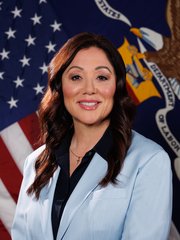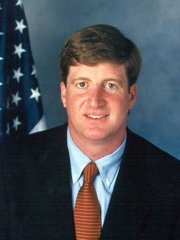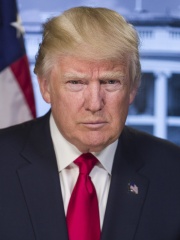




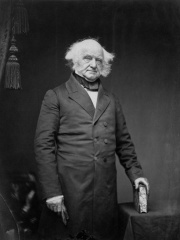


The Most Famous
POLITICIANS from United States
This page contains a list of the greatest American Politicians. The pantheon dataset contains 19,576 Politicians, 1,640 of which were born in United States. This makes United States the birth place of the most number of Politicians.
Top 10
The following people are considered by Pantheon to be the top 10 most legendary American Politicians of all time. This list of famous American Politicians is sorted by HPI (Historical Popularity Index), a metric that aggregates information on a biography's online popularity. Visit the rankings page to view the entire list of American Politicians.

1. Donald Trump (b. 1946)
With an HPI of 99.27, Donald Trump is the most famous American Politician. His biography has been translated into 253 different languages on wikipedia.
Donald John Trump (born June 14, 1946) is an American politician, media personality, and businessman who is the 47th president of the United States. A member of the Republican Party, he served as the 45th president from 2017 to 2021. Born into a wealthy New York City family, Trump graduated from the University of Pennsylvania in 1968 with a bachelor's degree in economics. He became the president of his family's real estate business in 1971, renamed it the Trump Organization, and began acquiring and building skyscrapers, hotels, casinos, and golf courses. He also launched side ventures, many licensing the Trump name, and filed for six business bankruptcies in the 1990s and 2000s. From 2004 to 2015, he hosted the reality television show The Apprentice, bolstering his fame as a billionaire. Presenting himself as a political outsider, Trump won the 2016 presidential election against Democratic Party nominee Hillary Clinton. During his first presidency, Trump imposed a travel ban on seven Muslim-majority countries, expanded the Mexico–United States border wall, and enforced a family separation policy on the border. He rolled back environmental and business regulations, signed the Tax Cuts and Jobs Act, and appointed three Supreme Court justices. In foreign policy, Trump withdrew the U.S. from agreements on climate, trade, and Iran's nuclear program, and initiated a trade war with China. In response to the COVID-19 pandemic from 2020, he downplayed its severity, contradicted health officials, and signed the CARES Act. After losing the 2020 presidential election to Joe Biden, Trump attempted to overturn the result, culminating in the January 6 Capitol attack in 2021. He was impeached in 2019 for abuse of power and obstruction of Congress, and in 2021 for incitement of insurrection; the Senate acquitted him both times. In 2023, Trump was found liable in civil cases for sexual abuse and defamation and for business fraud. He was found guilty in 34 counts of falsifying business records in 2024, making him the first U.S. president convicted of a felony. After winning the 2024 presidential election against then-vice president Kamala Harris, he was sentenced to a discharge, and two felony indictments against him for retention of classified documents and obstruction of the 2020 election were dismissed without prejudice. Trump began his second presidency by initiating mass layoffs of federal workers. He imposed tariffs on nearly all countries at the highest level since the Great Depression and signed the One Big Beautiful Bill Act. His administration's actions—including the targeting of political opponents and civil society, the persecution of transgender people, the mass deportation of immigrants, and the extensive use of executive orders—have drawn over 300 lawsuits challenging their legality. Since 2015, Trump's leadership style and political agenda—often referred to as Trumpism—have reshaped the Republican Party's identity. Many of his comments and actions have been characterized as racist or misogynistic. He has made many false or misleading statements during his campaigns and presidency, to a degree unprecedented in American politics. He promotes conspiracy theories. Trump's actions, especially in his second term, have been described as authoritarian and contributing to democratic backsliding. After his first term, scholars and historians ranked him as one of the worst presidents in American history.

2. Jimmy Carter (1924 - 2024)
With an HPI of 93.90, Jimmy Carter is the 2nd most famous American Politician. His biography has been translated into 164 different languages.
James Earl Carter Jr. (October 1, 1924 – December 29, 2024) was an American politician and humanitarian who served as the 39th president of the United States from 1977 to 1981. A member of the Democratic Party, Carter served from 1971 to 1975 as the 76th governor of Georgia and from 1963 to 1967 in the Georgia State Senate. He is the longest-lived president in U.S. history, the only U.S. President from Georgia, and the only one to reach the age of 100. Born in Plains, Georgia, Carter graduated from the U.S. Naval Academy in 1946 and joined the submarine service before returning to his family's peanut farm. He was active in the civil rights movement, then served as a state senator and the 76th governor, one of the first of the "New South governors" committed to desegregation. After announcing his candidacy in 1976, Carter secured the Democratic nomination as a dark horse little known outside his home state before narrowly defeating Republican incumbent Gerald Ford in the general election. As president, Carter pardoned all Vietnam draft evaders and negotiated major foreign policy agreements, including the Camp David Accords, the Panama Canal Treaties, and the second round of Strategic Arms Limitation Talks, and he established diplomatic relations with China. He created a national energy policy that included conservation, price control, and new technology. He signed bills that created the Departments of Energy and Education. The later years of his presidency were marked by several foreign policy crises, including the Soviet invasion of Afghanistan (leading to the end of détente and the 1980 Olympics boycott) and the fallout of the Iranian Revolution (including the Iran hostage crisis and 1979 oil crisis). Carter sought reelection in 1980, defeating a primary challenge by Senator Ted Kennedy, but lost the election to Republican nominee Ronald Reagan. Polls of historians and political scientists have ranked Carter's presidency below average. His post-presidency—the longest in U.S. history—is viewed more favorably. After Carter's presidential term ended, he established the Carter Center to promote human rights, earning him the 2002 Nobel Peace Prize. He traveled extensively to conduct peace negotiations, monitor elections, and end neglected tropical diseases, becoming a major contributor to the eradication of dracunculiasis. Carter was a key figure in the nonprofit housing organization Habitat for Humanity. He also wrote political memoirs and other books, commentary on the Israeli–Palestinian conflict, and poetry.

3. Thomas Jefferson (1743 - 1826)
With an HPI of 93.18, Thomas Jefferson is the 3rd most famous American Politician. His biography has been translated into 159 different languages.
Thomas Jefferson (April 13 [O.S. April 2], 1743 – July 4, 1826) was an American Founding Father and the third president of the United States from 1801 to 1809. He was the primary author of the Declaration of Independence. Jefferson was the nation's first U.S. secretary of state under George Washington and then the nation's second vice president under John Adams. Jefferson was a leading proponent of democracy, republicanism, and natural rights, and he produced formative documents and decisions at the state, national, and international levels. Jefferson was born into the Colony of Virginia's planter class, dependent on slave labor. During the American Revolution, Jefferson represented Virginia in the Second Continental Congress, which unanimously adopted the Declaration of Independence. Jefferson's advocacy for individual rights, including freedom of thought, speech, and religion, helped shape the ideological foundations of the revolution. This inspired the Thirteen Colonies in their revolutionary fight for independence, which culminated in the establishment of the United States as a free and sovereign nation. Jefferson served as the second governor of revolutionary Virginia from 1779 to 1781. In 1785, Congress appointed Jefferson as U.S. Minister to France, where he served from 1785 to 1789. President Washington then appointed Jefferson the nation's first secretary of state, where he served from 1790 to 1793. In 1792, Jefferson and political ally James Madison organized the Democratic-Republican Party to oppose the Federalist Party during the formation of the nation's First Party System. Jefferson and Federalist John Adams became both personal friends and political rivals. In the 1796 U.S. presidential election between the two, Jefferson came in second, which made him Adams' vice president under the electoral laws of the time. Four years later, in the 1800 presidential election, Jefferson again challenged Adams and won the presidency. In 1804, Jefferson was reelected overwhelmingly to a second term, crushing his main opposition, the Federalists' Charles Cotesworth Pinckney of South Carolina. Jefferson's presidency assertively defended the nation's shipping and trade interests against Barbary pirates and aggressive British trade policies, promoted a western expansionist policy with the Louisiana Purchase, which doubled the nation's geographic size, and reduced military forces and expenditures following successful negotiations with France. In his second presidential term, Jefferson was beset by difficulties at home, including the trial of his former vice president Aaron Burr. In 1807, Jefferson implemented the Embargo Act to defend the nation's industries from British threats to U.S. shipping, limit foreign trade, and stimulate the birth of the American manufacturing. Jefferson is ranked among the upper tier of U.S. presidents both by scholars and in public opinion. Presidential scholars and historians have praised Jefferson's advocacy of religious freedom and tolerance, his peaceful acquisition of the Louisiana Territory from France, and his leadership in supporting the Lewis and Clark Expedition. They acknowledge his lifelong ownership of large numbers of slaves, but offer varying interpretations of his views on and relationship with slavery.

4. Andrew Jackson (1767 - 1845)
With an HPI of 90.45, Andrew Jackson is the 4th most famous American Politician. His biography has been translated into 136 different languages.
Andrew Jackson (March 15, 1767 – June 8, 1845) was the seventh president of the United States from 1829 to 1837. He rose to fame as a U.S. Army general and served in both houses of the U.S. Congress. His political philosophy, which dominated his presidency, became the basis for the rise of Jacksonian democracy. His legacy is controversial: he has been praised as an advocate for white working Americans and preserving the union of states, and criticized for his racist policies, particularly towards Native Americans. Jackson was born in the colonial Carolinas before the American Revolutionary War. He became a frontier lawyer and married Rachel Donelson. He briefly served in the U.S. House of Representatives and the U.S. Senate, representing Tennessee. After resigning, he served as a justice on the Tennessee Superior Court from 1798 to 1804. He purchased a plantation later known as the Hermitage, becoming a wealthy planter who profited off the forced labor of hundreds of enslaved African Americans during his lifetime. In 1801, he was appointed colonel of the Tennessee militia and was elected its commander. He led troops during the Creek War of 1813–1814, winning the Battle of Horseshoe Bend and negotiating the Treaty of Fort Jackson that required the indigenous Creek population to surrender vast tracts of the present-day U.S. states of Alabama and Georgia. In the concurrent war against the British, Jackson's victory at the Battle of New Orleans in 1815 made him a national hero. He later commanded United States forces during the First Seminole War against the Seminoles and other allied Native groups. This campaign was one of the factors that prompted Spain to negotiate the cession of Florida to the United States, which was finalized in the Adams–Onís Treaty of 1819, in exchange for United States renunciation of territorial claims. He briefly served as Florida's first territorial governor before returning to the Senate. He ran for president in 1824. He won a plurality of the popular and electoral vote, but no candidate won the electoral majority. With the help of Henry Clay, the House of Representatives elected John Quincy Adams as president. Jackson's supporters alleged that there was a "corrupt bargain" between Adams and Clay (who joined Adams' cabinet) and began creating a new political coalition that became the Democratic Party in the 1830s. Jackson ran again in 1828, defeating Adams in a landslide victory despite issues such as his slave trading and his "irregular" marriage. In 1830, he signed the Indian Removal Act. This act, which has been described as ethnic cleansing, displaced tens of thousands of Native Americans from their ancestral homelands east of the Mississippi River. It resulted in thousands of deaths in what has become known as the Trail of Tears. Jackson faced a challenge to the integrity of the federal union when South Carolina threatened to nullify a high protective tariff set by the federal government. He threatened the use of military force to enforce the tariff, but the crisis was defused when it was amended. In 1832, he vetoed a bill by Congress to reauthorize the Second Bank of the United States, viewing the Bank as a fourth branch of government run by the elite. After a lengthy struggle, the Bank was dismantled. In 1835, Jackson became the only U.S. president to pay off the national debt. After leaving office, he supported the presidencies of Martin Van Buren and James K. Polk, as well as the annexation of Texas. Opinions about Jackson are often polarized. Supporters characterize him as a defender of democracy and the U.S. Constitution, while critics point to his reputation as a demagogue who ignored the law when it suited him. Scholarly rankings of U.S. presidents historically rated his presidency as above average. In the late 20th century his reputation declined, and in the 21st century his placement in rankings of presidents has fallen.

5. William McKinley (1843 - 1901)
With an HPI of 89.29, William McKinley is the 5th most famous American Politician. His biography has been translated into 124 different languages.
William McKinley (January 29, 1843 – September 14, 1901) was the 25th president of the United States, serving from 1897 until his assassination in 1901. A member of the Republican Party, he led a realignment that made Republicans largely dominant in the industrial states and nationwide for decades. McKinley successfully led the U.S. in the Spanish–American War and oversaw a period of American expansionism, with the annexations of Hawaii, Puerto Rico, Guam, the Philippines, and American Samoa. McKinley was the last president to have served in the American Civil War; he was the only one to begin his service as an enlisted man and end it as a brevet major. After the war, he settled in Canton, Ohio, where he practiced law and married Ida Saxton. In 1876, McKinley was elected to Congress, where he became the Republican expert on the protective tariff, believing protectionism would bring prosperity. His 1890 McKinley Tariff was highly controversial and, together with a Democratic redistricting aimed at gerrymandering him out of office, led to his defeat in the Democratic landslide of 1890. He was elected governor of Ohio in 1891 and 1893, steering a moderate course between capital and labor interests. McKinley secured the Republican nomination for president in 1896 amid a deep economic depression and defeated his Democratic rival William Jennings Bryan after a front porch campaign in which he advocated "sound money" (the gold standard unless altered by international agreement) and promised that high tariffs would restore prosperity. McKinley's presidency saw rapid economic growth. He rejected free silver in favor of keeping the nation on the gold standard, and raised protective tariffs, signing the Dingley Tariff of 1897 to protect manufacturers and factory workers from foreign competition and securing the passage of the Gold Standard Act of 1900. McKinley's foreign policy emulated the era's overseas imperialism of the great powers in Oceania, Asia, and the Caribbean Sea. The United States annexed the independent Republic of Hawaii in 1898, and it became the Territory of Hawaii in 1900. McKinley hoped to persuade Spain to grant independence to rebellious Cuba without conflict. Still, when negotiations failed, he requested and signed Congress's declaration of war to begin the Spanish-American War of 1898, in which the United States saw a quick and decisive victory. As part of the peace settlement, Spain turned over to the United States its main overseas colonies of Puerto Rico, Guam, and the Philippines, while Cuba was promised independence but remained under the control of the United States Army until May 20, 1902. In the Philippines, a pro-independence rebellion began; it was eventually suppressed. McKinley acquired what is now American Samoa when his administration partitioned the Samoan Islands with the United Kingdom and the German Empire in the Tripartite Convention, during a period of warming ties between the UK and US known as the Great Rapprochement. McKinley defeated Bryan again in the 1900 presidential election in a campaign focused on imperialism, protectionism, and free silver. His second term ended early when he was shot on September 6, 1901, by Leon Czolgosz, an anarchist. McKinley died eight days later and was succeeded by Vice President Theodore Roosevelt. Historians regard McKinley's 1896 victory as a realigning election in which the political stalemate of the post-Civil War era gave way to the Republican-dominated Fourth Party System, beginning with the Progressive Era. The United States retains control over the major territories McKinley annexed, aside from the Philippines which became independent in 1946. McKinley is generally ranked among the middle tier of presidents.

6. Ulysses S. Grant (1822 - 1885)
With an HPI of 89.19, Ulysses S. Grant is the 6th most famous American Politician. His biography has been translated into 135 different languages.
Ulysses S. Grant (born Hiram Ulysses Grant; April 27, 1822 – July 23, 1885) was the 18th president of the United States, serving from 1869 to 1877. He previously led the Union Army to victory in the American Civil War in 1865 as commanding general. Grant was born in Ohio and graduated from the United States Military Academy (West Point) in 1843. He served with distinction in the Mexican–American War, but resigned from the army in 1854 and returned to civilian life impoverished. In 1861, shortly after the Civil War began, Grant joined the Union Army, and he rose to prominence after securing victories in the western theater in 1862. In 1863, he led the Vicksburg campaign that gave Union forces control of the Mississippi River and dealt a major strategic blow to the Confederacy. President Abraham Lincoln promoted Grant to lieutenant general and command of all Union armies after his victory at Chattanooga. For thirteen months, Grant fought Robert E. Lee during the high-casualty Overland Campaign, which ended when Lee surrendered to Grant at Appomattox. In 1866, President Andrew Johnson promoted Grant to General of the Army. Later, Grant broke with Johnson over Reconstruction policies. A war hero, drawn in by his sense of duty, Grant was unanimously nominated by the Republican Party and then elected president in 1868. As president, Grant stabilized the post-war national economy, supported congressional Reconstruction and the Fifteenth Amendment, and prosecuted the Ku Klux Klan. Under Grant, the Union was completely restored. An effective civil rights executive, Grant signed a bill to create the United States Department of Justice and worked with Radical Republicans to protect African Americans during Reconstruction. In 1871, he created the first Civil Service Commission, advancing the civil service more than any prior president. Grant was re-elected in the 1872 presidential election, but was inundated by executive scandals during his second term. His response to the Panic of 1873 was ineffective in halting the Long Depression, which contributed to the Democrats winning the House majority in 1874. Grant's Native American policy was to assimilate Indians into Anglo-American culture. In his foreign policy, the Alabama Claims against Britain were peacefully resolved, but the Senate rejected his proposal to annex Santo Domingo. During the disputed 1876 presidential election, he facilitated the approval by Congress of a peaceful compromise. Leaving office in 1877, Grant undertook a world tour, becoming the first president to circumnavigate the world. In 1880, he was unsuccessful in obtaining the Republican nomination for a non-consecutive third term. In 1885, impoverished and dying of throat cancer, Grant wrote his memoirs, covering his life through the Civil War, which were posthumously published and became a major critical and financial success. At his death, he was the most popular American and was memorialized as a symbol of national unity. Due to the pseudohistorical and negationist mythology of the Lost Cause of the Confederacy spread by Confederate sympathizers around the turn of the 20th century, historical assessments and rankings of Grant's presidency suffered considerably before they began recovering in the 21st century. Grant's critics take a negative view of his economic mismanagement and the corruption within his administration, while his admirers emphasize his policy towards Native Americans, vigorous enforcement of civil and voting rights for African Americans, and securing North and South as a single nation within the Union. 21st century scholarship has praised Grant's appointments of Cabinet reformers.

7. Martin Van Buren (1782 - 1862)
With an HPI of 88.89, Martin Van Buren is the 7th most famous American Politician. His biography has been translated into 130 different languages.
Martin Van Buren ( van BYOO-rən; Dutch: Maarten van Buren [ˈmaːrtə(ɱ) vɑm ˈbyːrə(n)] ; December 5, 1782 – July 24, 1862) was the eighth president of the United States, serving from 1837 to 1841. A primary founder of the Democratic Party, he held a number of prominent offices. Van Buren served as New York's attorney general and U.S. senator, then briefly as the ninth governor of New York. After joining Andrew Jackson's administration, he served as the tenth United States secretary of state, minister to the United Kingdom, and ultimately, as the eighth vice president from 1833 to 1837, after being elected on Jackson's ticket in 1832. Van Buren won the presidency in 1836 against divided Whig opponents. He lost re-election in 1840, and failed to win the Democratic nomination in 1844. Later in life, Van Buren re-emerged as an elder statesman and an anti-slavery leader who led the Free Soil Party ticket in the 1848 presidential election. Van Buren was born in Kinderhook, New York, where most residents were of Dutch descent and spoke Dutch as their primary language. He is the only president to have spoken English as a second language. Van Buren entered politics as a member of the Democratic-Republican Party, won a seat in the New York State Senate, and was elected to the United States Senate in 1821. As the leader of the Bucktails faction of the party, he established the political machine known as the Albany Regency. Van Buren ran successfully for governor of New York to support Andrew Jackson's candidacy in the 1828 presidential election but resigned shortly after Jackson was inaugurated so he could accept appointment as Jackson's secretary of state. In the cabinet, Van Buren was a key Jackson advisor and built the organizational structure for the coalescing Democratic Party. He ultimately resigned to help resolve the Petticoat affair and briefly served as ambassador to the United Kingdom. At Jackson's behest, the 1832 Democratic National Convention nominated Van Buren for vice president, and he took office after the Democratic ticket won the 1832 presidential election. With Jackson's strong support and the organizational strength of the Democratic Party, Van Buren successfully ran for president in the 1836 presidential election. However, his popularity soon eroded because of his response to the Panic of 1837, which centered on his Independent Treasury system, a plan under which the federal government of the United States would store its funds in vaults rather than in banks. More conservative Democrats and Whigs in Congress ultimately delayed Van Buren's plan from being implemented until 1840. His presidency was further marred by the costly Second Seminole War and his refusal to admit Texas to the Union as a slave state. In 1840, he lost his re-election bid to William Henry Harrison. While Van Buren is praised for anti-slavery stances, in historical rankings, historians and political scientists often rank him as an average or below-average U.S. president, due to his handling of the Panic of 1837. Van Buren was initially the leading candidate for the Democratic Party's nomination again in 1844, but his continued opposition to the annexation of Texas angered Southern Democrats, leading to the nomination of James K. Polk. Increasingly opposed to slavery, Van Buren was the presidential nominee of the newly formed Free Soil Party in 1848, and his candidacy helped Whig nominee Zachary Taylor defeat Democrat Lewis Cass. Worried about sectional tensions, Van Buren returned to the Democratic Party after 1848 but was disappointed with the pro-southern presidencies of Franklin Pierce and James Buchanan. During the American Civil War, Van Buren was a War Democrat who supported the policies of President Abraham Lincoln, a Republican. Van Buren died of asthma at his home in Kinderhook in 1862, aged 79.

8. Hillary Clinton (b. 1947)
With an HPI of 88.79, Hillary Clinton is the 8th most famous American Politician. Her biography has been translated into 143 different languages.
Hillary Diane Rodham Clinton (née Rodham; born October 26, 1947) is an American politician, lawyer, and diplomat. She was the 67th United States secretary of state in the administration of Barack Obama from 2009 to 2013, a U.S. senator representing New York from 2001 to 2009, and the first lady of the United States from 1993 to 2001 as the wife of Bill Clinton. A member of the Democratic Party, she was the party's nominee in the 2016 presidential election, becoming the first woman to win a presidential nomination by a major U.S. political party and the only woman to win the popular vote for U.S. president. However, she lost the electoral college to Republican Party nominee Donald Trump. She is the only first lady of the United States to have run for elected office. Born in Chicago, Rodham graduated from Wellesley College in 1969 and from Yale Law School in 1973. After serving as a congressional legal counsel, she moved to Arkansas and, in 1975, married Bill Clinton. In 1977, Clinton co-founded Arkansas Advocates for Children and Families, and in 1979 she became the first woman partner at Little Rock's Rose Law Firm. Clinton was the first lady of Arkansas from 1979 to 1981 and again from 1983 to 1992. As the first lady of the U.S., Clinton advocated for healthcare reform. In 1994, her health care plan failed to gain approval from Congress. In 1997 and 1999, Clinton played a leading role in promoting the creation of the State Children's Health Insurance Program, the Adoption and Safe Families Act, and the Foster Care Independence Act. In 1998, Clinton's marital relationship came under public scrutiny during the Clinton–Lewinsky scandal, which led her to publicly reaffirm her commitment to the marriage. Clinton was first elected to the U.S. Senate in 2000, becoming the first female senator from New York. As a senator, she chaired the Senate Democratic Steering and Outreach Committee from 2003 to 2007. Clinton ran for president in 2008, and lost to Barack Obama in the Democratic primaries. During 2009, she resigned from the Senate to become Obama's secretary of state. She responded to the Arab Spring by advocating the 2011 military intervention in Libya, but was harshly criticized by Republicans for the failure to prevent or adequately respond to the 2012 Benghazi attack. Clinton helped to organize a regime of international sanctions against Iran in an effort to force it to curtail its nuclear program, which eventually led to the multinational Joint Comprehensive Plan of Action in 2015. The strategic pivot to Asia was a central aspect of her tenure. Her use of a private email server as secretary was the subject of intense scrutiny; while no charges were filed, the controversy was the single-most-covered topic during her second presidential run in 2016. She won the Democratic nomination, but lost the general election to her Republican Party opponent, Donald Trump, in the United States Electoral College, while winning the popular vote. Following her loss, she wrote multiple books and launched Onward Together, a political action organization dedicated to fundraising for progressive political groups. In 2011, Clinton was appointed the Honorary Founding Chair of the Institute for Women, Peace and Security at Georgetown University, and the awards named in her name has been awarded annually at the university. Since 2020, she has served as Chancellor of Queen's University Belfast. In 2023, Clinton joined Columbia University as a Professor of Practice at the School of International and Public Affairs.

9. Abraham Lincoln (1809 - 1865)
With an HPI of 87.87, Abraham Lincoln is the 9th most famous American Politician. His biography has been translated into 204 different languages.
Abraham Lincoln (February 12, 1809 – April 15, 1865) was the 16th president of the United States, serving from 1861 until his assassination in 1865. He led the United States through the American Civil War, defeating the Confederate States and playing a major role in the abolition of slavery. Lincoln was born into poverty in Kentucky and raised on the frontier. He was self-educated and became a lawyer, Illinois state legislator, and U.S. representative. Angered by the Kansas–Nebraska Act of 1854, which opened the territories to slavery, he became a leader of the new Republican Party. He reached a national audience in the 1858 Senate campaign debates against Stephen A. Douglas. Lincoln won the 1860 presidential election, becoming the first Republican president. His victory prompted a majority of the slave states to begin to secede and form the Confederate States. A month after Lincoln assumed the presidency, Confederate forces attacked Fort Sumter, starting the Civil War. As a moderate Republican, Lincoln had to navigate conflicting political opinions from contentious factions during the war effort. Lincoln closely supervised the strategy and tactics in the war effort, including the selection of generals, and implemented a naval blockade of Southern ports. He suspended the writ of habeas corpus in April 1861, an action that Chief Justice Roger Taney found unconstitutional in Ex parte Merryman, and he averted war with Britain by defusing the Trent Affair. On January 1, 1863, he issued the Emancipation Proclamation, which declared the slaves in the states "in rebellion" to be free. On November 19, 1863, he delivered the Gettysburg Address, which became one of the most famous speeches in American history. He promoted the Thirteenth Amendment to the U.S. Constitution, which, in 1865, abolished chattel slavery. Re-elected in 1864, he sought to heal the war-torn nation through Reconstruction. On April 14, 1865, five days after the Confederate surrender at Appomattox, Lincoln was attending a play at Ford's Theatre in Washington, D.C., when he was fatally shot by stage actor John Wilkes Booth, a Confederate sympathizer. Lincoln is remembered as a martyr and a national hero for his wartime leadership and for his efforts to preserve the Union and abolish slavery. He is often ranked in both popular and scholarly polls as the greatest president in American history.

10. James K. Polk (1795 - 1849)
With an HPI of 87.82, James K. Polk is the 10th most famous American Politician. His biography has been translated into 129 different languages.
James Knox Polk (; November 2, 1795 – June 15, 1849) was the 11th president of the United States, serving from 1845 to 1849. A protégé of Andrew Jackson and a member of the Democratic Party, he was an advocate of American expansionism and Jacksonian democracy. Polk saw Texas join the Union in his first year in office, one of the precipitating causes that soon led the U.S. into the Mexican–American War. The settlement of that war expanded American territory to the Pacific Ocean. During his term, the dispute over the Oregon Territory with the United Kingdom was also resolved, creating the present U.S.-Canadian boundary. After building a successful law practice in Tennessee, Polk was elected to its state legislature in 1823 and then to the United States House of Representatives in 1825, becoming a strong supporter of Jackson. Following his tenure as chairman of the Ways and Means Committee, he became Speaker of the House in 1835, the only person to serve both as Speaker and U.S. president. Polk left Congress to run for governor of Tennessee, winning in 1839 but losing in 1841 and 1843. He was a dark-horse candidate in the 1844 presidential election as the Democratic Party nominee. Polk entered his party's convention as a potential nominee for vice president but emerged as a compromise to head the ticket when no presidential candidate could gain the necessary two-thirds majority. In the general election, he narrowly defeated Henry Clay of the Whig Party and pledged to serve only one term. After a negotiation fraught with the risk of war, Polk reached a settlement with Great Britain over the disputed Oregon Country, with the territory for the most part divided along the 49th parallel. He oversaw victory in the Mexican–American War, resulting in Mexico's cession of the entire American Southwest. He secured a substantial reduction of tariff rates with the Walker tariff of 1846. The same year, he achieved his other major goal, reestablishment of the Independent Treasury system. True to his campaign pledge to serve one term (one of the few U.S. presidents to make and keep such a pledge), Polk left office in 1849 and returned to Tennessee, where he died of cholera soon afterward. Though he has become relatively obscure, scholars have ranked Polk in the upper tier of U.S. presidents, mostly for his ability to promote and achieve the major items on his presidential agenda. At the same time, he has been criticized for leading the country into a war with Mexico that exacerbated sectional divides. A property owner who used slave labor, he kept a plantation in Mississippi and increased his slave ownership during his presidency. Polk's policy of territorial expansion saw the nation reach the Pacific coast and almost all its contiguous borders. He helped make the U.S. a nation poised to become a world power, but with divisions between free and slave states gravely exacerbated, setting the stage for the Civil War.
People
Pantheon has 1,640 people classified as American politicians born between 1639 and 2001. Of these 1,640, 851 (51.89%) of them are still alive today. The most famous living American politicians include Donald Trump, Hillary Clinton, and Joe Biden. The most famous deceased American politicians include Jimmy Carter, Thomas Jefferson, and Andrew Jackson. As of April 2024, 107 new American politicians have been added to Pantheon including Pam Bondi, Pete Hegseth, and Usha Vance.
Living American Politicians
Go to all RankingsDonald Trump
1946 - Present
HPI: 99.27
Hillary Clinton
1947 - Present
HPI: 88.79
Joe Biden
1942 - Present
HPI: 86.00
Al Gore
1948 - Present
HPI: 84.97
George W. Bush
1946 - Present
HPI: 84.81
Bill Clinton
1946 - Present
HPI: 82.93
Barack Obama
1961 - Present
HPI: 81.12
Robert F. Kennedy Jr.
1954 - Present
HPI: 77.87
Jerome Powell
1953 - Present
HPI: 76.14
Jerry Brown
1938 - Present
HPI: 76.05
Steve Bannon
1953 - Present
HPI: 75.91
Bernie Sanders
1941 - Present
HPI: 75.22
Deceased American Politicians
Go to all RankingsJimmy Carter
1924 - 2024
HPI: 93.90
Thomas Jefferson
1743 - 1826
HPI: 93.18
Andrew Jackson
1767 - 1845
HPI: 90.45
William McKinley
1843 - 1901
HPI: 89.29
Ulysses S. Grant
1822 - 1885
HPI: 89.19
Martin Van Buren
1782 - 1862
HPI: 88.89
Abraham Lincoln
1809 - 1865
HPI: 87.87
James K. Polk
1795 - 1849
HPI: 87.82
Ronald Reagan
1911 - 2004
HPI: 86.36
George Washington
1732 - 1799
HPI: 86.03
John F. Kennedy
1917 - 1963
HPI: 86.01
Franklin D. Roosevelt
1882 - 1945
HPI: 85.92
Newly Added American Politicians (2025)
Go to all RankingsPam Bondi
1965 - Present
HPI: 56.40
Pete Hegseth
1980 - Present
HPI: 56.23
Usha Vance
1986 - Present
HPI: 52.58
Mike Waltz
1974 - Present
HPI: 48.69
Karoline Leavitt
1997 - Present
HPI: 47.26
Lara Trump
1982 - Present
HPI: 45.64
Morgan Ortagus
1982 - Present
HPI: 44.56
Eleni Kounalakis
1966 - Present
HPI: 43.70
John Curtis
1960 - Present
HPI: 43.49
Sean Duffy
1971 - Present
HPI: 43.21
Lori Chavez-DeRemer
1968 - Present
HPI: 42.94
Patrick J. Kennedy
1967 - Present
HPI: 42.65
Overlapping Lives
Which Politicians were alive at the same time? This visualization shows the lifespans of the 25 most globally memorable Politicians since 1700.

